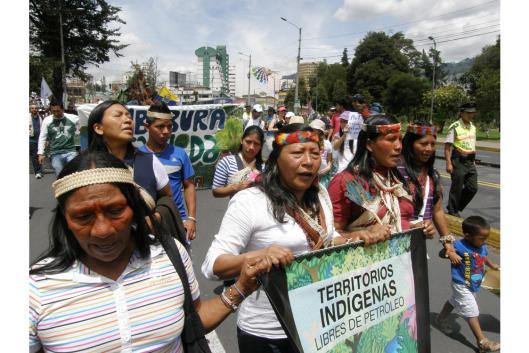In this editorial we would like to acknowledge the contribution that the Ecuadorian people have made to the world in the struggle for territories free of oil exploitation.
In August 2023, a national referendum won by almost 60 percent in favor of stopping oil exploitation in the Yasuní National Park; this is an Amazonian territory that Indigenous Peoples, including some in voluntary isolation, depend upon. Oil operations were already underway, forcing Petroecuador to dismantle its drilling rigs and infrastructure, and leave. “No more wells!” was the clear message of hope in support of the struggles to defend territories and life.
The results of the referendum were the fruit of committed, diverse and persevering movements, with Indigenous Peoples at the forefront. Members of the Waoraní People formed a delegation to travel to other territories and build ties of support with other Indigenous Peoples and sectors of the population.
This important and hopeful achievement of the Ecuadorian people has taken place at a time in which international elites—in particular oil companies—continue to cling to the power and profit they derive from fossil fuels. Let us not forget that these fuels are the pillars of the globalized capitalist economy; the fossil fuel industry, therefore, is strategic in the expansion of capital. Just five countries in the Global North are responsible for over half of current plans to expand oil and gas exploitation by 2050 (1).
Last September, on a panel with other CEOs of the world's largest energy companies, Vicki Hollub (CEO of U.S. oil company Occidental Petroleum) said: “I don't see where we are today as something that's going to end our industry, even though there are those who would like it to disappear. As we've done in the past, we will find ways to innovate out of the situation that we're in (…) The biggest challenge (…) is getting people to trust our industry again...” (2)
This statement exposes, once again, how the industry responsible for climate chaos and the devastation of countless territories and forests continues to deploy strategies to try to legitimize its business. Among other arguments, they claim that oil and gas are now “green,” “carbon neutral” or even “clean” (3). They back these claims with false solutions, such as carbon offset projects—which are mostly worthless and, even worse, harmful to communities, forests and the climate (4). The vast majority of these offset projects are related to forests and land, and in particular to conservation areas and industrial tree plantations (5). This, in turn, is a constant threat to forest-dependent peoples (6).
In this bulletin we share articles that show the flip side of these corporate greenwashing strategies: the many negative impacts that industrial tree plantations cause for peoples and territories in Uruguay, India, Brazil and Mozambique. Another article denounces the colonial model of protected areas, in particular the Kahuzi-Biega National Park in the Democratic Republic of Congo (DRC), and the Batwa People's struggle to recover their ancestral lands.
Once again, it is peoples and grassroots movements that model coherence and wisdom in the fight for life. Only by leaving fossil fuels in the ground can we move toward many possible worlds. In a press release, the Confederation of Indigenous Nationalities of Ecuador (CONAIE, by its Spanish acronym) announced: “The victory of the YES vote means that the Ecuadorian people have chosen to save life, to raise awareness about our Tagaeri, Taromenane and Dukagaeri brothers and sisters in voluntary isolation, and to vote YES to save their territory, their lives, their food sovereignty, and their medicines in the sacred rainforest. This YES is a respite for Yasuní and for the Andean Chocó, which are ecosystems of enormous biodiversity. Ecuador is making a significant contribution in the fight against climate change. We have won at the polls, and we are proclaiming this message so that other peoples of the world can also make use of their rights as citizens to protect nature” (7).
We reiterate the following statement made by an activist and former Minister of Energy in Ecuador: “What we need is to multiply the number of Yasunís around the world” (8).
(1) OilChange, 2023, Planet Wreckers: How 20 Countries’ Oil and Gas Extraction Plans Risk Locking in Climate Chaos
(2) CNBC, 2023, ‘We are not in the business of ice cream’: Big Oil CEOs defend themselves against climate criticism
(3) AgenciaBrasil, 2023, Petrobras lanza la primera gasolina neutra en carbono de Brasil
(4) See for example: The Guardian, 2023, Revealed: top carbon offset projects may not cut planet-heating emissions; REDD-Monitor, 2023, Carbon offset deals in fictitious Carbon Dioxide Removal technologies; Suriname: Real oil and fake offsets; Mongabay, 2022, At a plantation in Central Africa, Big Oil tries to go net-zero,
(5) Ecosystem Marketplace Database
(6) See several articles and publications on REDD's impact on forest peoples here
(7) CONAIE, 2023, Celebramos el triunfo del SÍ por Yasuní y el Chocó Andino
(8) David Hill, 2023, ‘What we need is to multiply the number of Yasunis around the world'
